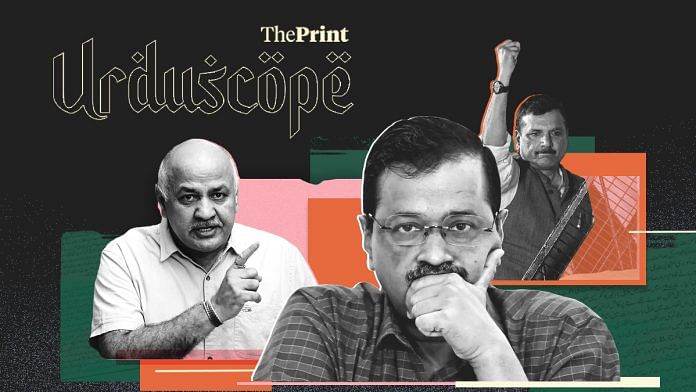New Delhi: The arrest of Aam Aadmi Party (AAP) leaders over the alleged Delhi liquor scam case continued to dominate the Urdu press this week, with editorials cautioning opposition leaders to “stay united” in the face of such government crackdown.
Inquilab’s editorial on 3 April said that the government’s action on opposition leaders appears to have two objectives – first, to create the perception that they are all corrupt, and second is to demoralise them before the election.
“Whatever the case, this election is the toughest yet for opposition parties, so their preparation should be on a war footing,” the editorial said.
While the current Opposition unity is commendable, this is only the first step, it added.
“Real unity will only be seen when parties support each other at the booth level. We don’t know how much preparation has been made for this, but it’s certain that if this is not done, their unity will only be on paper.”
The upcoming Lok Sabha elections and the National Council of Educational Research and Training (NCERT)’s latest revisions in school textbooks were other topics widely covered this week. Here’s a round-up of all the news that made the front pages and editorials of the Urdu press.
Also Read: BJP ‘wants no competition’, was spooked by AAP-Congress tie-up — Urdu press on Kejriwal arrest
AAP and corruption
Editorials took a triumphant view of AAP Rajya Sabha MP Sanjay Singh’s release on bail in the alleged liquor policy scam, seeing it as a vindication of their stand that the Opposition was being targeted.
“Sanjay Singh was granted bail in the Delhi liquor scam, which provided an opportunity for the central government to target opposition parties, especially the AAP. Now, there are indications that it may be difficult for investigative agencies to prove their allegations in court,” Siasat’s 3 April editorial said.
In its editorial the same day, Roznama Rashtriya Sahara accused the Bharatiya Janata Party (BJP) of giving refuge to tainted leaders while claiming to root out corruption. For this, it cited the case of G. Janardhana Reddy, saying that the mining baron’s statement after returning to the BJP shows that the party and corrupt individuals are “natural allies”.
Reddy, a former Karnataka minister who faces illegal mining allegations, returned to the BJP in March.
“Janardhana Reddy feels that his return to the BJP after a long time is a relief. He (says he) has returned to his mother’s lap. And yet, (despite this development), Prime Minister Narendra Modi and Home Minister Amit Shah talk about continuing the fight against corruption,” the editorial said.
Lok Sabha elections
In its editorial on 5 April, Siasat said the BJP, after dealing with regional parties, was now moving towards “targeting” the Congress. It was referring to the spate of defections from the Congress, with the latest being former spokesperson Gourav Vallabh.
“The BJP is seen to be trying to influence and pressure Congress by provoking its leaders to join the party. Some Congress leaders are discontented despite being given previous opportunities,” the editorial said, advising patience to such disgruntled leaders.
In its editorial on 4 April, Sahara made a case for EVMs. Like every machine, EVMs too have flaws. However, demanding that elections be conducted through ballot paper after using EVMs is like advocating travel by a bullock cart after a train accident, the editorial said.
“Before the advent of EVMs, when ballot papers were used, it used to take several days for election results to come out. However, modern machines made the process easier and quicker. There have been efforts in recent years to make voting better and more transparent,” it said.
Inquilab’s editorial on 2 April worried about how political rhetoric and speeches tend to eclipse the real problems plaguing the country. While the biggest fault lies with the media, influential people cannot escape from their duty of creating awareness, it said.
“What’s happening in the country should be kept in front of the people,” the editorial said.
Siasat’s editorial, on the same day, said there have been attempts to create the perception that West Bengal Chief Minister and Trinamool Congress chief Mamata Banerjee has left the INDIA bloc and is fighting the election alone.
“Although Mamata Banerjee is indeed fighting the election alone in Bengal, she has not bid the alliance farewell. TMC leader Derek O’Brien said today that his party has been a part of the INDIA bloc since its inception and will continue to remain so,” the editorial said, adding that while there may be differences of opinion between them, they have come together for a purpose and “it’s their responsibility to defend the country’s democracy”.
NCERT revisions
On 5 April, Sahara commented on NCERT’s latest revisions. In its latest move, the NCERT has decided to drop references to the 1992 Babri Masjid demolition, instead highlighting the Ram Janmabhoomi movement in a positive light. According to the NCERT, the content is being updated “as per the latest development in politics”.
The editorial, however, saw it as an attempt to “distort” history.
“Everything in India has turned upside down,” this editorial said.
“India is changing its perspective on mankind’s journey from the beginning of life on Earth to the modern age of development, from the Stone Age to the present, does not align with the world (and its views), and this may not be a good sign in the days to come,” the editorial said, adding that there’s a fear that India might “isolate itself from the world of knowledge”.
(Edited by Uttara Ramaswamy)
Also Read: BJP’s claim that it doesn’t know donors’ identities ‘a lie’ — Urdu press on electoral bonds



